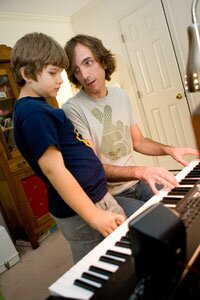FACETIME- Max, understood? Professor interprets autism with music

PHOTO BY WILLIAM WALKER
For Michael Rasbury the parent, finding out his son Max was autistic provoked worry, torment, and anxiety. For Michael Rasbury the composer and UVA professor of sound design, finding out about Max stoked another fire.
"The first thing I did was think: what may Max be hearing in his head?" Rasbury explains. "The play uses sound to instigate the entire fantasy."
He's speaking about a musical Max Understood that he co-composed with Berkeley-based writer Nancy Carlin in 2007. After hitting several smaller theater festivals, Max recently hit the big leagues with an acceptance into the prestigious New York Musical Theatre Festival.
It's an honor that brings Rasbury a mixed bag of surprises. Just like his son.
Utilizing his academic knowledge of sound design, Rasbury, 40, says he was able to compose a piece rich with "repetitions, pared-down phrases– things that remind me of the behaviors I see in my son," he says. Influenced by minimalist composers, such as John Luther Adams and Philip Glass, Rasbury took observations of Max and translated them into a musical dreamscape.
"Max Understood is not a dreary, look-through-the-window-at-family-living-with-autism play," he insists. "It goes into a dream state, so we get to see what may be happening in Max's head."
It's a vision Rasbury hopes to spread to audience members in order to tear down the stereotypes and barriers autism presents.
"The beauty of what Michael is doing is a 'when life gives you lemons, you make lemonade' kind of thing," says friend and Chickenhead Blues Band frontman Aric van Brocklin. "He's making sense of it, from all the viewpoints that he can."
As for the Festival, it brings in some big-name audience members to see experimental, fledgling works, with an opportunity to make a big impact on New York industry buffs. But along with the opportunity comes with a big price tag: a budget of $26,000 that each play must raise on its own.
Remembering a time when autistic children made him uncomfortable, Rasbury hopes the audience will open up their hearts, minds– and perhaps wallets– to what may be the beautiful reality of an often-painful disorder.
"In the play, I'm trying to show how beautiful an experience it is," says Rasbury. "I don't want to cure him, but instead want to harness his creativity and make the best of the situation."
#